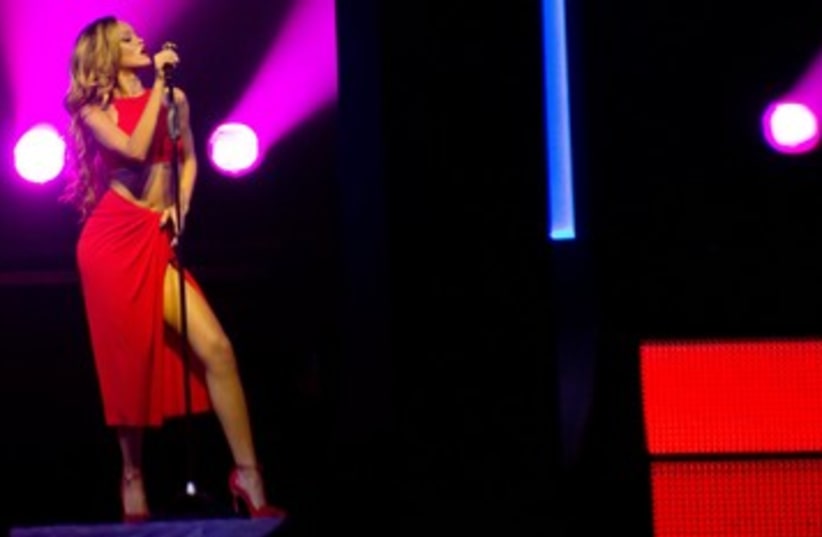Then, two things seemed to happened at once. News sources like Buzzfeed and The Huffington Post, as well as several sites in the Arab world, picked up the story, some referring back to my tweet with comments like “the Israeli media is not happy.”I started receiving tweets like: “If Haaretz reported about a pro-Palestinian comment, it’s possibly because all the other papers are more right-wing.”The story that was being written was that not only did Rihanna make a pro-Palestinian comment, but I was part of some vast right-wing conspiracy, as Hillary Clinton would put it, to cover up the truth.For all the conspiracy theorists: Had Rihanna said “all I see is Palestine,” I would have done my duty as a journalist and reported what happened and I would have put it in the context of the efforts of the Palestinian Boycott, Divestment and Sanctions Movement to convince Rihanna not to perform in Israel.You might think “who cares if a pop star makes a pro-Palestinian comment?” I would have thought the same and left things with my original, snarky tweet, had the story not started to reach international audiences.But once it made waves around the world, it took on another aspect and could appear like a BDS victory.See, the Palestinian BDS movement tried to convince Rihanna to cancel the concert, but she, like many other artists, ignored them.Plus, by saying “all I see is Palestine,” while in Tel Aviv, she would be sympathizing with the most extreme anti-Israel elements, who think the Palestinian state’s borders should be from the Jordan River to the Mediterranean Sea.In any case, there were more important news stories that day.But I thought it was worth taking a few minutes to tweet to Buzzfeed World editor Miriam Elder that I don’t think the story is true, and respond to those who doubted me that I was at the concert and heard nothing about Palestine, before moving on with my busy workday wrapping up municipal election results.If every newspaper in the country sent ppl to the @rihanna concert & only Haaretz heard a pro-Palestinian comment, it probably didn't happen
— Lahav Harkov (@LahavHarkov) October 23, 2013
That evening, twitter follower Akiva Wienerkur sent me a video of Rihanna singing Pour it Up in Tel Aviv that proved, without a doubt, that she did not switch “dollar signs” for “Palestine.”I once again sent the video to the doubters. It was retweeted many times that evening and sent to the Twitter accounts of Haaretz and its editor-in-chief, Aluf Benn. I must say that it was early enough that the newspaper was unlikely to have gone to press already.The next morning, I woke up to find that a friend sent me a photo of Haaretz’s front page – the Rihanna- Palestine article was on the cover. Hasbara NGO StandWithUs’s Israel director Michael Dickson (disclosure: I participated in their fellowship as a college student) wrote a much-shared blog post bashing the newspaper, and Hebrew-language media criticism site Presspectiva did the same.At that point, I was more than incensed. I was livid. I could not and still cannot understand how they printed that story hours after a video disproving it was disseminated online.One can argue whether “new journalism” is a legitimate style of reporting or not, but Haaretz allows its reporters to adopt it, and as such, does not emphasize objectivity in its news pages the way The Jerusalem Post does. That is why, for example, Haaretz published an article earlier this year on Palestinian rock-throwing in the news section, in which Amira Hass wrote, “throwing stones is the birthright and duty of anyone subject to foreign rule.”I don’t know the reporter, I’ve never met them, and I am by no means saying they intentionally lied. But perhaps they were thinking about the BDS pressure on Rihanna, or maybe they wereworking on a story related to Palestinians and had Palestine on the mind, and misheard. People make mistakes – and this was a mistake. However, they or one of their editors should have tried to verify the story in the first place, and should have pulled it immediately once the video emerged.In any case, I found myself at the center of a Twitter whirlwind on Thursday morning. I tried to juggle advocating on Twitter for Haaretz to correct the story with the job I’m being paid for – to report on The Jerusalem Post Diplomatic Conference.I have to give credit where it’s due, to Dickson, who did the real heavy lifting in contacting Haaretz directly. I just riled up the crowds on Twitter, where, admittedly, it’s almost too easy to make mountains out of molehills and foment arguments.By Thursday afternoon, Haaretz corrected the story, writing that Rihanna didn't reference Palestine.Yair Rosenberg, a reporter at Tablet tweeted a corrected Buzzfeed article, writing “moral of the story: Don’t mess with Lahav Harkov.”A Washington Post blog wrote up the story, referring to me. I started getting congratulatory tweets, which were flattering, but also kind of confusing. All this for a few tweets? After all, other people, like Dickson, were the ones who made them go viral.In any case, even though I didn’t bring peace to the Middle East or convince Iran to stop developing nuclear weapons, I’m glad I won a battle – small as it may be – in the war on Israel’s image and the fight for truth in journalism. I’m a proud Zionist, and if that’s the one thing clouding my journalistic objectivity, so be it.@MiriamElder I was there and I didn't hear her say it. Only Haaretz reported it. I really don't think it's true.
— Lahav Harkov (@LahavHarkov) October 23, 2013
